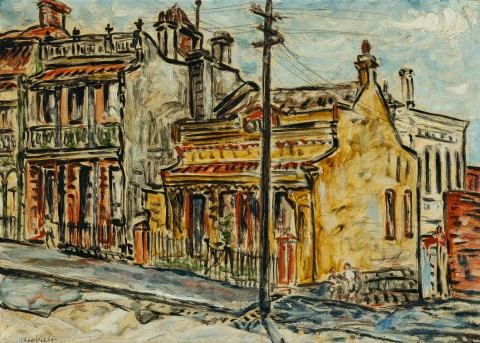EAST MELBOURNE HILLSIDE, STEEP STREET, c.1930s
DANILA VASSILIEFF
oil on canvas
35.0 x 49.0 cm
signed lower left: Vassilieff
Private collection, a gift from the artist in 1945
Sotheby’s, Sydney, 14 August 1990, lot 208
Joseph Brown Gallery, Melbourne
The Cbus Collection of Australian Art, Melbourne, acquired from the above on 20 August 1990
on long term loan to Gippsland Art Gallery, Victoria
Nainby, B., Stanhope, Z., and Furlonger, K., The Cbus Collection of Australian Art, in association with Latrobe Regional Gallery, Melbourne, 2009, pp. 61 (illus.), 236
Born in South Russia in 1897 – the son of a Cossack father and Ukrainian mother – Danila Vassilieff cut an exotic figure in 1930s Melbourne. His liberated approach to art eschewed formal training and theory, and his belief that the creative act was something direct and physical, as opposed to being driven by aesthetics and intellect, garnered him enthusiastic friends and followers.1 Young artists including Albert Tucker, who described him as the ‘father figure for his generation’, valued his experience and example as a painter who refused to be constrained by rules and tradition.2 Although Vassilieff’s paintings had their detractors, others regarded them highly, celebrating their vitality and raw expressive power. Writing in response to Vassilieff’s 1938 exhibition at Riddell Galleries, Melbourne, Herald art critic Basil Burdett had a bet each way, acknowledging that ‘His technical shortcomings may outnumber the sores of Lazarus but his pictures are alive.’3 Vance Palmer, who contributed an introduction to the exhibition catalogue, was less ambivalent, declaring:
‘Each of these pictures burns with a strange intensity. Each gives out an excitement from its core, quickening the eyesight and the imagination… The answer I think must lie in the artist himself. The secret passion that has been put into the work, by whatever technical method, comes out again to affect the beholder. Vassilieff has been profoundly moved by life – the commonplace life of back street and country hillside – and so he has the power to move us, too. Perhaps that is the only valid reason why men should either paint or write.’4
Vassilieff painted a range of subjects but is arguably best known for his images of street life which, viewed from our twenty-first century perspective, provide a fascinating and nostalgic glimpse into the past. Whether he depicts children playing, as in Fitzroy Street Scene, 1937 (Art Gallery of New South Wales), or people posing for a commercial street photographer, as in Smith Street, c.1939 (National Gallery of Australia), Vassilieff captures his working-class subjects directly, with honesty and a palpable sense of empathy. He frequently painted in Fitzroy, Collingwood and East Melbourne, where, as his partner noted at the time, ‘He does not need to go searching for subjects… he often has a chat with the children of the neighbourhood and paints them’.5 The primary focus of this painting is the buildings, single and double-story Victorian terrace houses with their distinctive bluestone foundations, built cheek by jowl along the steep East Melbourne street. Forms are outlined in black paint and the palette is muted and earthy, but Vassilieff’s technique of painting on a white ground in a series of rapid, sketchy strokes – almost like drawing with a paint brush – as well as leaving areas of the ground exposed, imparts a liveliness and sense of luminosity to the image. Basil Burdett perhaps best summed up these street scenes, writing that ‘[Vassilieff’s] pictures of Fitzroy and Surry Hills are almost as racily Australian as an epic of urban life by C. J. Dennis…[his] is the authentic vision of a man of sensibility and power’.6
1. See St. John Moore, F., Vassilieff and His Art, Oxford University Press, Melbourne, 1982, p. 42
2. Albert Tucker quoted in Uhl, C., Albert Tucker, Lansdowne Press, Melbourne, 1969, p. 14
3. Burdett, B., ‘Is Australian Art so Dull, After All?’, Herald, Melbourne, 17 October 1938, p. 11
4. Palmer, V., Introduction to Catalogue, Riddell Galleries, October 1938 quoted in St. John Moore, op.cit., pp.46-47
5. Helen MacDonald, quoted in Herald, Melbourne, 23 February 1938 quoted in St. John Moore, op. cit., p. 43
6. Burdett, B., Herald, Melbourne, 16 September 1937 quoted in St. John Moore, op. cit., p.40
KIRSTY GRANT
